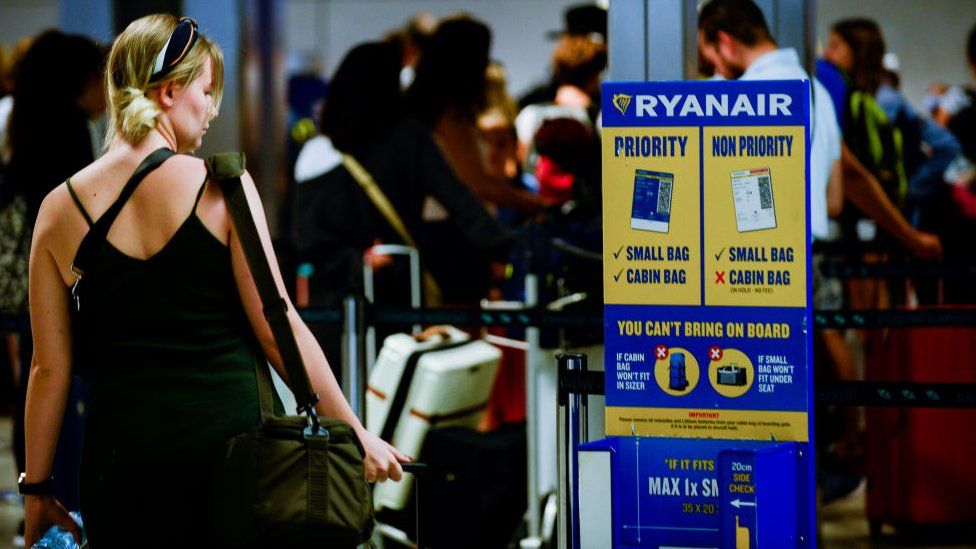
Ryanair passengers will be familiar with its strict policies on cabin baggage
By Riyah Collins
BBC Newsbeat
If the best things in life are free, you won’t find many of them on a Ryanair flight – and its social media accounts aren’t shy to say so.
On TikTok, Insta and X, the company’s become known for ripping into its passengers and its own reputation.
Being rude and obnoxious to your customers might not seem like the best approach, but the brand’s viral burns have earned it 2.1 million followers on TikTok – half a million more than EasyJet, Jet2, Tui, British Airways, Virgin Atlantic and Etihad combined.
And while corporate LOLs might make a lack of legroom easier to swallow, is there another reason brands want us to see the funny side?
One man who knows is Michael Corcoran.
He was the head of Ryanair’s social media until he recently announced his resignation on – where else? – X.
Hundreds of people replied praising him for turning the Irish airline into an online star, and shared some of their greatest hits.
Examples included talking planes roasting customers, and the company telling complaining passengers to “bring their own plane” next time they fly.
And there were more than a few references to 11A – the notoriously unpopular airline seat number with its own meme.
Image source, X
Customer support wasn’t a priority for the Ryanair social media account
If you’ve seen any Ryanair TikToks, you won’t be surprised to learn that the team was given a lot of freedom to post what they like.
Michael tells BBC Newsbeat this aspect wasn’t actually a departure for the company, which has a history of “disruptive, provocative marketing, whether people liked it or not”.
And lots of people didn’t.
In 2012, its “Red Hot Fares & Crew!” campaign was banned for objectifying women, and more recently a “Jab and Go” advert aimed at vaccinated holidaymakers attracted more than 2,000 complaints.
But on social media its sarcastic clapbacks in feeds and comment sections won it a surprising number of fans.
Michael says one of his team’s main goals was to lower passengers’ expectations of budget travel, which are “far too high”.
“We get you from A to B for the lowest price possible,” says Michael. “Everything else is extra.”
And by everything, he really does mean everything.
As well as extra baggage and legroom, passengers have to shell out to sit together. In August a couple went viral after the airline charged them £110 to print their tickets at the airport.
You’ll often see Ryanair accused of ripping customers off with added fees, but it leans into this online – an ongoing gag is whether passengers will eventually be charged to use the toilet.
“Obviously, not everybody found it funny,” says Michael.
“Some people thought we were genuinely being rude and obnoxious to our customers.”
Image source, Michael Corcoran
Michael Corcoran has now left Ryanair but says he’s proud of the work his team did
But when the humour landed, Michael noticed Ryanair’s online fans would start defending it against complaints – basically doing some of their PR for them.
“That took that corporate edge over us being ‘the bad guy’ off,” Michael says.
Does shedding your “bad guy” image also allow you to duck away from less comfortable topics? Where most brands will post proudly about their latest socially responsible schemes, Ryanair’s accounts tend to steer clear of worthy posts.
You won’t see anything about the aviation industry’s environmental impact, for example, even though Michael insists climate change is “incredibly important” to Ryanair.
Michael says TikTok isn’t the right place for an airline to talk about this – “because we are metal machines in the sky” – and worries it would look like “greenwashing”.
He says the company’s working on finding “the right channels and the right places” to better communicate this.
‘Really backfire’
But Dr Irene Garnelo-Gomez, from Henley Business School, thinks differently and says transparency is key.
She hesitates to accuse Ryanair of greenwashing because it doesn’t actually talk about its sustainability goals on its social channels.
But if consumers suspect companies aren’t being upfront about the impacts of their operations, her research suggests it could have a negative impact on brand perception.
“I don’t agree with organisations saying that social media is not the place to talk about sustainability, especially with younger generations,” she says.
“They care and they are aware, and they want organisations to do something about it.
“And where do they see communications? On social media.”
Dr Irene says that using humour does build engagement with customers, but it also might make it more difficult to use social channels to respond to serious criticisms.
“If at the same time they are accused of something in relation to sustainability, that humour and those posts could really backfire,” she says.

